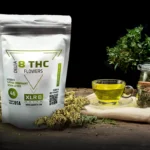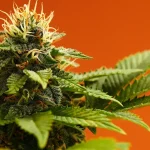Delta 9 THC is a known cannabinoid due to its psychoactive effects. But there is more to Delta 9 than making you high. In this blog, we’ll delve deep into what Delta 9 THC is, its potential benefits, safety considerations, optimal dosage guidelines, and the legal landscape surrounding its use.
What is Delta 9?
Delta 9 is scientifically called delta-9-tetrahydrocannabinol. It is a naturally occurring plant chemical present in both marijuana and hemp plants. A major cannabinoid, Delta 9 can induce specific effects on both mind and body once administered to the human body.
For several years, Delta 9 THC has been put under a bad light. Some motion pictures even went on to provide the viewing public with exaggerated and inaccurate information about this major cannabinoid.
Thanks to the passing of the 2018 Farm Bill, Delta 9 THC products may be considered legal on the federal level if they are sourced from hemp plants. This pivotal change spurred the availability of legal hemp-derived products containing noteworthy amounts of Delta 9 THC, expanding accessibility and usage. XLR8 is a known provider of Farm Bill-compliant products including those infused with Delta 9.
How Does Delta 9 Work?
Just like CBD, and other cannabinoids, Delta 9 interacts with the human endocannabinoid system (ECS). The latter is believed to regulate specific bodily functions including appetite, pain perception, and relaxation. ECS has several cannabinoid receptors that are distributed to different parts of the human body.
The interaction between Delta 9 and the ECS is key to understanding how THC exerts its effects on cognition, mood, and perception. Notably, THC primarily targets two major cannabinoid receptors: CB1 and CB2.
CB1 receptors are predominantly located in the brain and central nervous system. When Delta 9 THC binds to CB1 receptors, it modulates various functions such as memory, pain perception, mood, appetite, and coordination. This interaction contributes significantly to the psychoactive effects associated with THC consumption.
On the other hand, CB2 receptors are primarily found in peripheral organs and cells related to the immune system. While Delta 9 THC has a lower affinity for CB2 receptors compared to CB1 receptors, its interaction with CB2 receptors plays a role in immune system modulation and inflammation regulation.
Additionally, Delta 9 THC activates the brain’s reward system, specifically by triggering the release of dopamine. Dopamine is a neurotransmitter associated with feelings of pleasure and reward. This dopamine release leads to the euphoric sensations commonly experienced after consuming THC-containing products.
The activation of the brain’s reward system by Delta 9 THC is instrumental in reinforcing behaviors associated with pleasurable effects, contributing to the potential for addiction. With repeated use, the brain learns to associate THC consumption with rewarding feelings, leading to a cycle of seeking out and using THC to replicate those pleasurable sensations.
Delta 9 THC Benefits: Top Reasons It Is Popular
Delta 9 THC is the cannabinoid that is responsible for the high we typically associate with marijuana use. Although it is a psychoactive plant compound, Delta 9 THC can bring about certain medical benefits such as the following:
Pain Management
Many hemp and cannabis users consume Delta 9 THC products in order to dampen pain. It is believed that this cannabinoid can help deal with different types of pain:
Cancer Pain: A preliminary trial found that ingesting Delta 9 THC orally provided significant pain relief for patients experiencing cancer-related pain. In doses of 15mg and 20mg, Delta 9 THC demonstrated analgesic effects compared to a placebo.
Stomach Pain: Research reviews indicate that Delta 9 THC may have therapeutic potential for addressing abdominal pain caused by inflammatory bowel disease (IBD). Additionally, cannabinoids like Delta 9 THC may help reduce nausea, which is often associated with stomach-based pain.
Back Pain: Studies on neuropathic pain suggest that Delta 9 THC may be beneficial for various forms of back pain, particularly pain originating in the spine.
Sleep Quality
Delta 9 THC derived from hemp has shown promise in improving sleep quality for individuals with conditions such as chronic pain, PTSD, multiple sclerosis, and restless legs syndrome (RLS). Products containing Delta 9 THC have been reported to help people fall asleep faster, experience fewer disruptions during the night, and enjoy overall better sleep quality.
Stimulated Appetite
Aside from its psychoactive effects, Delta 9 THC is known for stimulating appetite, commonly referred to as “the munchies.” This effect is attributed to Delta 9 THC’s ability to decrease levels of peptide tyrosine tyrosine (PYY), a compound that influences appetite. Delta 9 THC also increases ghrelin, known as the hunger hormone, and interacts with pro-opiomelanocortin (POMC) neurons, further promoting appetite stimulation.
The appetite-stimulating properties of Delta 9 THC can be particularly beneficial for individuals with certain medical conditions where maintaining a healthy appetite is essential.
While Delta 9 THC shows promise in these areas, it’s crucial to note that further research is needed to fully understand its efficacy, dosage requirements, and potential long-term effects. Consulting with a healthcare professional before using Delta 9 THC for medicinal purposes is recommended to ensure safe and effective use.
Delta 9 Dosage Guide
Now, you want to know how much Delta 9 is safe for you to consume, right?
When it comes to dosing Delta 9 THC, several important factors come into play. This is because dosage varies significantly from person to person and is influenced by factors such as age, height, weight, gender, diet, and cannabis use experience.
To navigate dosage variability and minimize risks, it’s crucial to start with professionally made edibles with a known dosage. XLR8 is your best starting point since all of our products come with clear packaging and we indicated how much cannabinoid is present per serving.
The importance of starting with a low dose cannot be overstated. Even for experienced cannabis users, edibles can have a stronger and longer-lasting effect compared to inhalation methods.
It’s recommended to start with a low dose, often around 2.5-5mg of Delta-9 THC, especially for individuals new to THC or those with low tolerance. Waiting at least 2 hours before considering increasing the dosage is essential, as edibles can take longer to take effect compared to smoking or vaping.
For a more detailed discussion of Delta 9 dosage head over to this article.
Delta 9 vs Delta 8 vs Delta 10
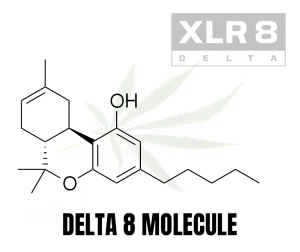
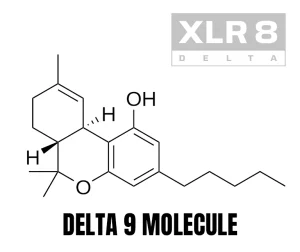
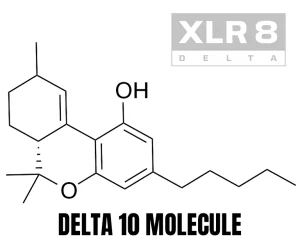
Delta 9 is a close relative of Delta 8 and Delta 10. One major difference between these three THC molecules is their potency. Delta-9 is the most potent, delta-10 has the mildest effect, and delta-8 (you guessed it) is right in the middle. Below is a comparison chart that you should find useful in understanding Delta 8, 9, and 10 THCs.
| Feature | Delta 8 | Delta 9 | Delta 10 |
| Source | Found in minimal quantities in cannabis plants; can be produced from hemp plants in concentrated amounts | Abundant in marijuana plants; trace amounts in hemp plants | Found in cannabis plants; often lab-produced from hemp-derived CBD |
| Psychoactive effect | Mild psychoactive properties, less intense and shorter-lasting high compared to Delta-9 | Known for its psychoactive effects, potent and longer-lasting high | Can produce intoxication, less potent than Delta-9 |
| Interaction | Binds to cannabinoid receptors in the endocannabinoid system | Binds strongly to CB1 and CB2 receptors in the brain and body | Binds to CB1 and CB2 receptors in the ECS |
| Common uses | Smoking, vaping, tinctures, edibles, infused beverages | Smoking, vaping, edibles, sublingual, topical products | Vaping, smoking, edibles, tinctures, topicals |
| Medical potential | Limited studies show Delta 8 potential for pain relief, appetite stimulation, nausea relief, relaxation, anxiety reduction | Wide range of possible medical uses including pain relief, anxiety, PTSD, Alzheimer’s | Emerging research suggests Delta 10’s possible benefits such as stress relief, reduced anxiety, creativity enhancement |
| Risks and safety | Limited research, potential risks from synthetic manufacturing, possible side effects include dry mouth, fatigue | Potent effects, risk of adverse reactions at high doses, potential for addiction | Limited research on effects and risks, possible adverse effects unknown |
Delta 9 vs CBD
Delta 9 and CBD are two prominent cannabinoids that you can both derive from a hemp plant. Each has its own distinct properties and effects.
Psychoactive effects
- Delta-9 THC: Known for its psychoactive effects, producing a “high” or altered mental state, increased appetite, elation, relaxation, talkativeness, and laughter. Can also lead to negative side effects like paranoia or anxiety, especially at high levels.
- CBD: Psychoactive in the sense that it can influence mood, such as reducing anxiety, but does not produce a high or altered mental state like THC. Can induce relaxation, drowsiness, dry mouth, and decreased appetite.
Legal status
- Delta-9 THC: Generally subject to legal restrictions due to its psychoactive properties. Legalization varies by region, with medical and recreational use allowed in some areas. Delta 9 infused products are considered legal if they are sourced from the hemp plant that has less than 0.3% THC.
- CBD: Legalized in many places, especially if derived from hemp with low THC content (less than 0.3%). Widely available in various forms due to its non-psychoactive nature.
Medical potential
- Delta-9 THC: Strong evidence for treating conditions like pain (analgesia), nausea and vomiting, and certain neurological disorders like multiple sclerosis (MS). However, the potential for intoxication limits its widespread medical use.
- CBD: Studied extensively for its analgesic, anxiolytic (anxiety-reducing), and anti-inflammatory properties. Shows promise in treating various medical conditions without causing intoxication, making it more accessible for therapeutic use.
Does Delta 9 Come with Risks?
After consuming Delta 9 goodies, they do produce some potential benefits (we already discussed them above). However, overconsumption or taking the wrong dosage can lead to some side effects:
- Anxiety
- Difficulty Thinking and Speaking
- Dry Mouth
- Increased Appetite
- Memory Loss
- Rapid Heart Rate
- Red Eyes
- Slowed Reaction Times
Is Delta 9 Legal?
Delta 9 THC’s legality hinges on its source, whether from marijuana or hemp plants. Federally, Delta 9 THC sourced from marijuana remains illegal. However, many states have legalized its possession and use for medical purposes, often with specific regulations and requirements.
On the other hand, Delta 9 THC derived from hemp plants is legal at the federal level under certain conditions. The 2018 Farm Bill legalized hemp and hemp-derived products containing less than 0.3% THC. This distinction is crucial because hemp contains lower THC levels compared to marijuana, making Delta 9 products sourced from hemp compliant with federal law as long as they meet the THC threshold.
The legal status of Delta 9 THC can be complex due to varying state laws and regulations. While federal law permits hemp-derived Delta 9 THC, individual states may have additional restrictions or guidelines regarding its production, distribution, and use.
How to Use Delta 9 THC
There are different ways to incorporate Delta 9 THC into the human body. Below are some Delta 9 forms available:
Gummies
One popular option is Delta 9 THC-infused gummies, providing a convenient and tasty way to consume the cannabinoid. Each gummy typically contains a measured dose of Delta 9 THC, making it easier for users to control their intake. Effects from gummies may take longer to onset compared to inhalation methods but can last longer as well.
Oils
Another common method of using Delta 9 THC is through oils or tinctures. These products are administered sublingually, meaning they are placed under the tongue for absorption. Delta 9 THC oils often come with droppers, allowing users to measure precise doses. Sublingual absorption enables a faster onset of effects compared to edibles, making it a popular choice for those seeking quicker relief.
Vapes
For those who prefer inhalation, Delta 9 THC vapes offer a convenient and efficient way to consume the cannabinoid. Vape pens or cartridges containing Delta 9 THC allow for rapid onset of effects, making them ideal for immediate relief. However, users should exercise caution and ensure the quality and safety of vape products to avoid potential health risks associated with vaping.
Lotions
Delta 9 THC also comes in the form of lotions or topicals, which are applied directly to the skin. These products are commonly used for localized pain relief or to soothe skin conditions. Effects from topicals are typically localized to the area of application and may not produce systemic effects like other methods.
Capsules
Individuals who favor a conventional method may try Delta 9 THC capsules since these provide a discreet and convenient means of ingesting the cannabinoid. Each capsule is filled with a predetermined dose of Delta 9 THC, enabling accurate dosing. Although the effects of capsules may require more time to kick in than inhalation or sublingual methods, they also tend to have a longer duration of action.
Frequently Asked Questions
Can Delta 9 THC make you fail a drug test?
Yes, Delta 9 THC can cause a person to fail a drug test, especially if the test is designed to detect THC metabolites in the body. Most drug tests, including urine tests and blood tests, look for THC metabolites as evidence of cannabis use. Since Delta 9 THC is the primary psychoactive compound in cannabis, its presence in the body can lead to a positive result on a drug test.
Is Delta 9 THC similar to CBD?
While Delta 9 THC (tetrahydrocannabinol) and CBD (cannabidiol) are both cannabinoids derived from the cannabis plant, they have distinct properties and effects, making them quite different from each other.
What are Delta 9 products used for?
Delta 9 products are consumed for their supposed benefits such as appetite stimulation and pain relief.
How long do the effects of Delta 9 last?
The duration of Delta 9 THC effects can vary depending on the method of consumption, dosage, individual tolerance, and metabolism. Generally, effects can last from a few hours to several hours, with peak effects occurring within 30 minutes to 2 hours after consumption.



